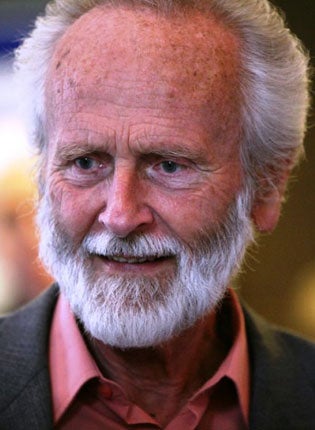Fred Kaan: Minister and celebrated hymn writer

Fred Kaan was known and honoured throughout the English speaking world as a hymn writer. He was in the tradition of reformed ministers such as Philip Doddridge who wrote hymns to follow and sum up the sermons they preached. Having started to write hymns early in his ministry, his output grew steadily during his career.
The post-war years witnessed an explosion of hymn writing that can loosely be categorised into two groups. There were those writers who worked in a traditional style, seeking to add their 20th-century contribution to the corpus of hymns used down the years by churches of all traditions. And there were those who introduced a new style of "worship song" designed to appeal to today's congregations.
Kaan was impatient with this second group, referring somewhat disparagingly to their songs as "the nursery rhymes of the church". His place was firmly with the former group, standing alongside the likes of Fred Pratt Green, Alan Gaunt and Brian Wren. His hymns, which include both original work and translations from a variety of languages, address the modern challenges to faith, notably issues of peace and justice, and are known and used right across the spectrum of Christian churches.
Fred Kaan was born in Haarlem in the Netherlands in July 1929. Although he was baptised in St Bavo Cathedral, he did not set foot in a church until his late teens. He lived through the Nazi occupation and witnessed the death of three grandparents from starvation. His parents were deeply involved in the resistance movement, taking refugees into their home. All this had a profound influence on Kaan. He became a pacifist, began attending church and was confirmed in 1947.
During this time Kaan began a pen friendship with a young congregationalist in Britain, which engendered his fascination with British Congregationalism, later to become the United Reformed Church. In 1952 he was accepted for ministerial training at the Western College in Bristol. Ordained in 1955 at the Windsor Road Congregational Church in Barry, Glamorgan, he ministered there until 1963 when he was called to Pilgrim Church in Plymouth.
It was in this responsive congregation that his artistic and poetic gifts became evident and his hymn-writing began to take flight. The first edition of Pilgrim Praise was published in 1968, going into second and third editions in 1972 and 1975. His hymns have subsequently been published in over 15 languages, but many would say that the best come from his time in local pastoral ministry.
In 1968 Fred was called to serve the church internationally, moving to Geneva to become minister-secretary of the International Congregational Council. A passionate ecumenist, he played a significant role in uniting this organisation with the much larger World Alliance of Reformed Churches in 1970, serving this united body as secretary until 1978. His facility with languages came to the fore, enabling him to develop inter-church relations, an aid programme and to highlight concerns for human rights. He ran the four-language Reformed Press Service, edited Reformed World, and co-produced the three-language radio programme Intervox.
Along the way, he served as chairman of the Council for World Mission – an international agency for Christian mission that developed from the overseas missionary work of the British Congregational churches. He claimed to have visited faith communities in 83 countries, some many times over. No mean scholar, he added a ThD from Debrecen and a PhD from Geneva, North Carolina to his qualifications.
In 1978, Fred was called back to Britain to serve as moderator of the West Midlands Provincial Synod of the United Reformed Church. But he was not entirely comfortable in this ministry of oversight, and served only one term. In 1985, he entered his final pastorate in Swindon. Here he felt more fulfilled, once declaring that his preaching had developed considerably now that he was engaged weekly with the same congregation.
In retirement, he spent four years as honorary secretary of the Churches' Human Rights Forum in Britain and Ireland. He continued his steady output of hymns, working with the Norwegian composer Knut Nystedt to create a number of works, and with Ron Klusmeier of Canada who composed over a hundred tunes for Kaan texts. He was made a Fellow of the Hymn Society of the USA in 2001, and in 2002 was awarded the Chancellor's Gold Medal by the Potchefstroom University in South Africa.
Fred's last years were overshadowed by the onset of Alzheimer's disease and by cancer, during which time he was lovingly and devotedly cared for by his wife, Anthea. A giant of a man with incalculable influence in many fields – literary, artistic, theological, ecclesiastical, ecumenical – he remained to the end essentially a humble man, a sensitive pastor, and a firm friend to a wide circle. He was first married to Elizabeth (Elly) Steller, the daughter of Dutch missionaries, with whom he had three children: Martin, Peter and Alison, and later married Anthea Cooke, who survives him.
Keith Forecast
Frederik Herman Kaan, minister of the church: born Haarlem, the Netherlands 7 July 1929; ordained 1955, the Windsor Road Congregational Church; minister of Windsor Road 1955-63; minister of Pilgrim, Plymouth 1963-68; minister- secretary, International Congregational Council 1968-70; secretary, World Alliance of Reformed Churches 1968-78; moderator, West Midlands Province 1978-85; moderator, Central and Penhill, Swindon 1986-90; married 1954 Elizabeth (Elly) Steller (deceased; two sons, one daughter); married 1994 Anthea Cooke; died Penrith, Cumbria 4 October 2010.
Subscribe to Independent Premium to bookmark this article
Want to bookmark your favourite articles and stories to read or reference later? Start your Independent Premium subscription today.

Join our commenting forum
Join thought-provoking conversations, follow other Independent readers and see their replies